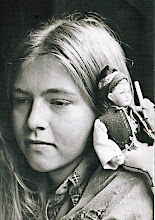Well, O.K., interesting picture, but the least they could do for the postcard, besides including an apostrophe in the I'm, is to actually put the man behind the gun. In any case, the front of this postcard is nothing; it's the back side that we're interested in here:
The card, sent to Mr. Denis Purcell, in 1915 says:
Just a line to let you know I won one hundred bucks on the fight. I am getting that watch cleaned, I thought Johnson was due for a knock out.
A hundred bucks was a lot of money then, so you know it had to be a big fight.
John Arthur "Jack" Johnson was also known as the
Galveston Giant. He was the first black heavyweight boxing champion (1908-1915.) Each of Johnson's fights, from the 1908 victory over Canadian world champion Tommy Burns, until the match where he was defeated, awakened a huge amount of racial animosity. After Johnson's first and unprecedented victory, Jack London called for the Great White Hope (James Jeffries) to take the title back. Johnson managed to defeat every opponent he was matched with, including James Jeffries in 1910. Here's a photo of Johnson.
A number of companies had filmed the Johnson/Jeffries fight and distributed the footage as a documentary. This was an unwelcome suggestion of black supremacy for many white people, and there was an effort to suppress the film. In fact, because of this film, Congress banned prizefight films from being distributed across state lines in 1912, a ban that wasn't lifted until 1940.
Although Johnson's victory over Jeffries may have silenced some critics, it also caused race riots all across the United States. White boxing fans had staked their hopes on Jeffries, and those hopes had been dashed. Black boxing fans, on the other hand, were in a celebratory mood, which only made the situation worse. In the ensuing riots, 23 blacks and two whites were killed, and many more were injured.
On April 15, 1915, Johnson lost his title to Jess Willard, ending his run as heavyweight boxing champion. This was the bout on which our sender won a hundred bucks.
Beyond boxing, Johnson was certainly a very courageous and eclectic man. He had an interest in opera and opened a nightclub in Harlem. He later sold the nightclub, which became known as the Cotton Club. He was married three times, always to white women, at least two of whom appear to be former prostitutes. Johnson was arrested and convicted of violating the Mann Act for taking one of these women across state lines. Afterward, he fled the country and lived abroad with the woman. Although there have been efforts to grant him a posthumous presidential pardon (most recently spearheaded by John McCain, Peter King, and Frank Burns), they have yet to be successful.
Jack Johnson died in a car crash in 1946. he was driving erratically after being refused service at a diner near Raleigh, North Carolina when the accident happened.




